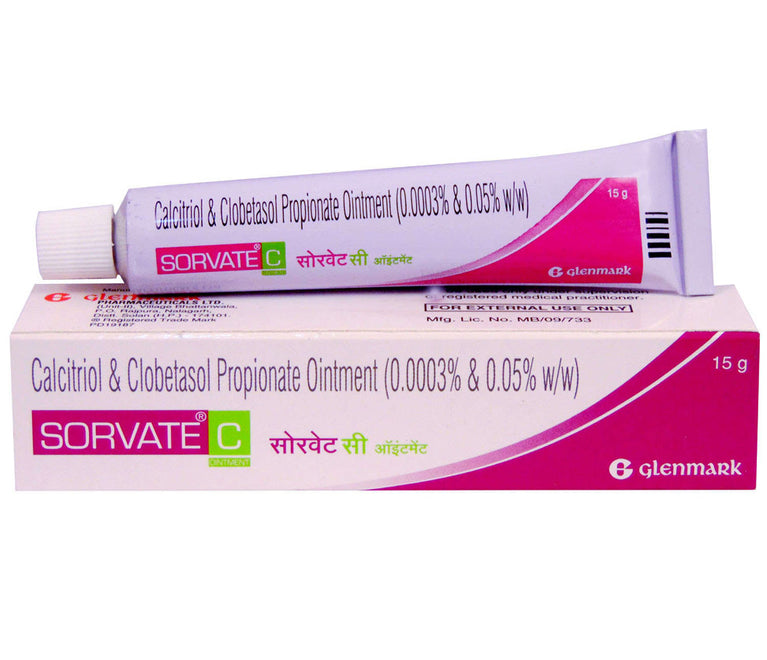Use DERMA120 to get ₹120 off on Order ₹2999+
Sorvate C Ointment
Prescription Required- Regular price
- ₹ 386.00
- Sale price
- ₹ 386.00
- Regular price
-
₹ 454.50 - Unit price
- / per
Offers
-
-
Use
DERMA50to get ₹50 off on Order ₹1999+
Product Highlights:
- Quickly alleviates skin irritation and conditions
- Promotes regeneration and reduces inflammation
- Absorbs easily for daily use without residue
Share
Couldn't load pickup availability
Shipping & Returns
- Free Shipping on Orders Above ₹999
- 7-Day Hassle-Free Returns
- Real-Time Tracking Updates
- Secure & Eco-Friendly Packaging
- Cash on Delivery (COD) Available

Product Description:
Sorvate C Ointment is a prescription medicine having a combination of medicines that are used to treat psoriasis. It decreases the overproduction of skin cells. It helps to provide relief from redness, itching and swelling.
Key Ingredients:
- Clobetasol (0.05% w/w)
- Calcitriol (0.0003% w/w)
Composition:
Calcitriol (0.0003% w/w) + Clobetasol (0.05% w/w)
Key Uses/Benefits:
- Sorvate C Ointment 15 gm comprised two medicines, Clobetasol (corticosteroid) and Calcitriol (Vitamin D3).
- Calcitorl minimises the excessive production of skin cells that may build up and form scales on the skin. At the same time, Clobetasol is a corticosteroid medicine that restricts the production of certain chemical messengers (prostaglandins) responsible for red, swollen, itchy skin.
- It also suppresses the body's extreme immune response and calms it to improve the itchy, scaly skin rash.
Safety/Storage Information:
Store in a cool and dry place below 30°C. Do not freeze. Keep the medicine out of the reach of children.
Country Of Origin:
India
Frequently Asked Questions (FAQs):
Sorvate C Ointment is a prescription medicine used to treat psoriasis. It helps reduce the overproduction of skin cells, providing relief from symptoms like redness, itching, and swelling associated with psoriasis.
Sorvate C Ointment contains two active ingredients: Clobetasol (a corticosteroid) and Calcitriol (Vitamin D3). Calcitriol helps minimize the excessive production of skin cells, which can lead to scaling. Clobetasol, on the other hand, reduces inflammation, itching, and swelling by inhibiting the production of certain chemical messengers in the body.
Sorvate C Ointment provides relief from psoriasis symptoms such as redness, itching, and swelling. It helps manage the condition by reducing the overproduction of skin cells and calming the immune response in the affected areas.
Sorvate C Ointment is specifically formulated for the treatment of psoriasis and may not be suitable for other skin conditions. It is important to consult a healthcare professional for proper diagnosis and treatment recommendations.
It is essential to consult with a healthcare professional before using Sorvate C Ointment, especially if you have diabetes or any other medical condition.
Sorvate C Ointment contains a potent corticosteroid (betamethasone), so it should be used with caution on the face or sensitive areas, such as the eyes or groin. If applying to these areas, follow your healthcare provider's instructions carefully. Typically, it is advised to use lower-potency steroids on the face or in sensitive areas to minimize potential side effects, such as skin thinning.
If you are pregnant or breastfeeding, it is important to consult your healthcare provider before using Sorvate C Ointment. Although betamethasone is a topical corticosteroid, it can still be absorbed into the bloodstream, especially if used over large areas or for long periods. Your doctor will assess whether the benefits outweigh the potential risks for you and your baby.
This ointment is a blessing. My skin feels soft, and the irritation is gone.
This is the only product that has helped my stubborn psoriasis patches. It softens my skin and reduces irritation within days. It's worth every penny!
I’ve had itching issues for years due to allergies, and this lotion has been a huge relief. It starts working immediately, and my skin feels much better after each use.
Combat acne without harsh chemicals or side effects.
Had a fantastic experience. Both the product and service were excellent.

